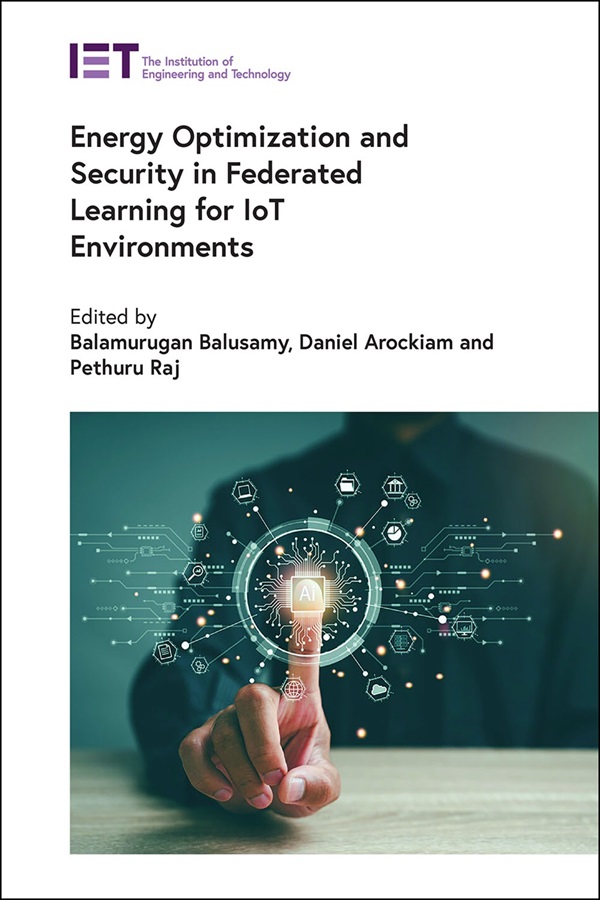- Agricultural Engineering and Technology
- Applied Physics
- Built Environment
- Computing and Networks
- Control, Robotics and Sensors
- Electrical Regulations
- Electromagnetics and Radar
- Energy Engineering
- Healthcare Technologies
- History and Management of Technology
- IET Codes and Guidance
- Manufacturing
- Materials, Circuits and Devices
- Model Forms
- Security
- Telecommunications
- Transportation

Energy Optimization and Security in Federated Learning for IoT Environments
Edited by Balamurugan Balusamy, Daniel Arockiam, Pethuru Raj
Smart environments such as smart homes and industrial automation have been transformed by the rapid developments in internet of things (IoT) devices and systems. However, the widespread use of these devices poses significant difficulties, particularly in settings with limited energy resources. Due to the significant energy consumption and communication overhead associated with delivering huge amounts of data, traditional machine learning algorithms which rely on centralized cloud servers for training are not always suitable.
Federated learning is a decentralized strategy that enables collaborative machine learning model training while keeping the data local on edge devices. It has emerged as a suitable solution to overcome the energy constraints of IoT devices. Federated learning works by dividing the training process among several nodes and using the processing power of edge devices. As opposed to sending raw data to a central server, only the model changes are communicated thereby considerably lowering the communication costs while protecting data privacy. This strategy reduces energy usage while simultaneously reducing network latency and bandwidth-related problems.
In this book, the authors show how to optimise federated learning algorithms and develop new communication protocols and resource allocation methodologies to maximize energy savings while retaining respectable model accuracy, to develop long-lasting and scalable IoT solutions that can function independently with no dependency on an external cloud infrastructure.
Energy Optimization and Security in Federated Learning for IoT Environments is intended to be a useful resource for academic researchers, R&D professionals, IoT engineers in the IT industry, and data scientists creating optimised AI models to be run in cloud environments.
About the Editors
Balamurugan Balusamy is the associate dean of student engagement at Shiv Nadar University, Delhi-NCR, India. His research focuses on cybersecurity, blockchain, data science, cloud environments, IoT, and engineering education. He has published over 200 papers, contributed to 80 edited and authored books, and given 200 talks at international events and symposiums. He serves in the advisory committee for several start-ups and forums and does consultancy work for the industry on Industrial IoT. He holds a PhD degree in 'Investigations of Cloud Computing Access Control Techniques' from VIT University, Vellore, India.
Daniel Arockiam is an associate professor in the Department of Computer Science and Engineering at Amity University, Gwalior, Madhya Pradesh, India. His research areas include neural networks, AI, ML, DL, FL, and cloud computing. He has published 45 papers in international journals and conferences. He is a member of CSTA, IFERP, and IAEng. He was a member of the organising committee for GuCon 2019 and 2020 conferences. He holds a PhD degree in 'Hybrid Approaches to Optimise the Performance of Load Balancing and Task Scheduling in Cloud Environment' from Shri Venkateshwara University, India.
Pethuru Raj is a chief architect and the vice president of Reliance Jio Platforms Ltd. Bangalore, India. He focuses on the Internet of Things (IoT); artificial intelligence; big data analytics, blockchain, digital twins; edge, fog, and cloud computing; reliability engineering; microservices architecture (MSA), 5G and 6G, and event-driven architecture (EDA). He previously worked at IBM global Cloud Center of Excellence (CoE), Wipro Consulting Services (WCS), and Robert Bosch Corporate Research (CR). He has authored and edited 35+ books and contributed to 35 book chapters. He is a member of ACM. He holds a PhD degree on 'Formal Language Theory and Finite Automata' from Anna University, Chennai, India.
Publication Year: 2024
Pages: 349
ISBN-13: 978-1-83953-962-6
Format: HBK
